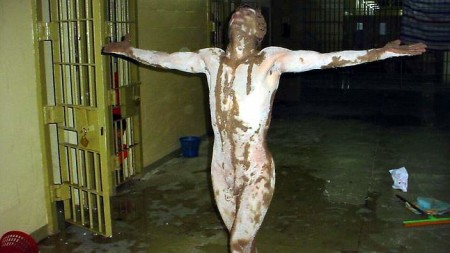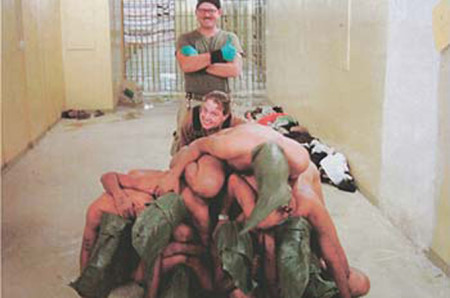Those who exercise raw power with little restraint often use circular reasoning to justify their actions. Inevitably, these same individuals also believe in their own wisdom and righteousness as expressed in a form of logic that sounds like this — “We are virtuous, and therefore we are good human beings. Because we are good, if we say something we do is true and good, because we say so, then it is so.”
Those who defend America’s use of “enhanced interrogation” also believe that we do so for good and noble reasons — to protect American lives. If they believe this, why do they hide what they have done?
They argue that they do not want information released to the public because it will embolden our enemies and hurt our relationships with other allies. Simultaneously, they assert that “enhanced interrogation”, their Orwellian term for torture, was necessary and even heroic because three thousand innocent people died in the Twin Towers; therefore we can and must do anything to kill those who did this to us and to prevent such an event from every happening again. This is one of the clearest examples of that point-of-view:
“I pray to God that until the end of time, we do whatever we have to do to find out what’s happening,” followed by “I don’t care what we did.” *
Photos taken at Abu Ghraib prison in Iraq. Naked prisoners piled up. Smiling American guards. These are photographs of torture we do possess.
Albert Camus, who fought the Nazis inside occupied France, famously wrote that we can neither be the victim nor the executioner, that we must find a space between those extremes in which to live as moral creatures. Those who defend torture claim both of those poles as their right — we are victims and may again be so, and therefore we may also be executioners. Within those boundaries, that small, fortified circle, all is permissible — we must be safe; therefore we must do whatever is necessary.
There is no room in that tightly drawn circle for the exercise of justice based on law. To paraphrase Wallace, we may do anything, and perhaps we should do everything. That perspective guarantees these decisions will be based on shifting notions of fear, safety, and expediency. To do “whatever we have to do” makes no action out of bounds. Everything is allowed. Lawyers can be found who will cobble together a legal basis for any action and thus provide cover. Under such conditions the law itself becomes a malleable instrument, merely another weapon to be wielded against any enemy instead of a binding hold on our fears and psychoses.
And after doing terrible things, we still claim that we “[stopped] short” of actual torture. Vice President Cheney on Meet The Press*#:
“Torture, to me … is an American citizen on his cellphone making a last call to his four young daughters shortly before he burns to death in the upper levels of the Trade Center in New York on 9/11. There’s this notion that there’s moral equivalence between what the terrorists did and what we do, and that’s absolutely not true. We were very careful to stop short of torture.”
In the same interview he admitted to not having read the Senate report on CIA interrogations. A recent poll suggests he speaks for a majority of the American people.
Blood trails at Abu Ghraib. American guards in control of the prison.
ISIS beheads unbelievers, machine-guns terrified huddles of the innocent in ditches, distributes booklets describing how best to rape their female captives. Hamas calls for the extermination of the Jewish State, and thus for one final genocide. In Peshawar, Pakistan, the Taliban machine-gun children taking their exams. Al Qaeda in Yemen and in Somalia and elsewhere plot acts of mass murder to take place in the United States and Europe. Our enemies are real and merciless. They believe in “the unlimited power to inflict death (305).” **
What of us? When we use torture, where does it take us? Are we to imitate our enemies? Are we to use the terrible suffering of our 3000 dead from 9-11 to validate the suffering we inflict now, what Jane Mayer describes as “unthinkable cruelty [becoming] official US policy (43)?” ^* Our 3000 can no longer speak. Does Dick Cheney speak for them, Nicole Wallace, Karl Rove, Michael Hayden, George Bush?
If we approve of our own heinous actions, defend them as good and as necessary, where will we stop? If we act outside International Law, American Law, and common decency, what will restrain the ones we hire to tear others apart? Once we allow those actions and normalize them, do you really believe that they will not someday be used inside this country? Can we believe in torture without losing our democracy?
Prisoner at Abu Ghraib covered in a brown substance and forced to stand in a stress position. American guards in control of the prison.
What are our core beliefs now? In safety at all costs? In allowing the hired men in those dark prisons to do anything so long as we do not have to be reminded of what they do? Do we want them to lie to us, and hide it from our sight?
Camus on the French use of torture against Algerian rebels in the 1950’s and 60’s: “The moment torture is justified, even indirectly, there are no more rules and values; all causes are equally good, and war without aims or laws sanctions the triumph of nihilism (84).” ##
We are sliding toward what Camus called a “casuistry of blood (85),” where our dead give us the moral right to go beyond the world of combat and into places we have sworn not to go, into a land ruled by our worst impulses. ##, ^
History is the agent of cause and effect. I fear that what we have purposely done, consciously done with full forethought of the malice we are inflicting, has already set in motion a terrible dynamic that right now is threading through time and toward future events. Torture sends out reverberations that penetrate the walls of the dark prisons where it is practiced. Our actions come down through time and into history. There is no place to hide from their consequences.
* December 9, 2014. The Morning Joe Program on MSNBC. Nicole Wallace, former spokeswoman for President George W. Bush.
*# December 14, 2014
^* from “Torture And The Truth” in The New Yorker, December 22 and 29, 2014
## “Preface To Algerian Reports” from Resistance, Rebellion and Death by Albert Camus
^ President Reagan signed the UN Conventions Against Torture
** from The Rebel by Albert Camus


We should not do to them what they do to use. We are the bigger people. The fact that each of these actions are held in secret, makes it harder to believe they are doing this for our safety. Doing these actions is not going to keep us safe. It is only going to make the people angry and want revenge for taking their people. In result, these people could take your children and loved ones. Do you want this in return? Are we willing to take the sacrifices? It is said that torture situations do not help with the terrorist situation anyway, such as Osama bin Ladin. So why are we torturing? What are we getting out of it? We are killing and murdering to many people. Yeah, they deserve to be beaten for the wrongs they have done, but not this brutally. The question I have, Is torture benefiting us in anyway? or is it hindering us from our allies and enemies?
Torture is not the answer to get another answer confessed. Terrorist and anyone else we torture are going to give wrong information first as you torture them because they want you to stop. We should not have to drop down to their level just because they are a lower group of people and we are much better than them. If we torture others it’s going to make the U.S. look so bad, so let’s fond a better way to get answers out of others and not torture.
Torture is not the answer to anything. There are better options out there. Beating them this badly isn’t the right idea. Yes, they should be beaten but there is not need to beat them this brutally. Beating them until they are basically dead because they won’t tell you the truth is pointless in my opinion. We as the United States are better then that.
To torture or not to torture is a tricky question, and despite the points I hear from both sides I still agree that it is a justifiable thing to do as it is a part of war. Many argue that America is lowering their sense of morality and pride by lowering themselves to the level of the terrorist, however we have to keep in mind that this is a war. With or without torture we are still bombing enemy cities, engaging in firefights, and killing these war criminals. Why is it that only torturing them to gather information that could better protect our home country is being considered heinous and abominable? Torturing a guilty terrorist to save lives of hundreds and maybe even thousands of innocent lives is justifiable in my opinion. As for the incidents that took place at Abu Ghraib prison, “Nine U.S. Army soldiers have been court-martialed and convicted of crimes committed at Abu Ghraib prison. Beyond the nine convictions, four soldiers and eight officers received official reprimands and a number of officers were suspended or relieved of their duties” (Prosecutions and Convictions).These soldiers and their commanding officers were misusing their power and for this they were rightfully punished. I am a supporter of torturing to acquire information or confessions, however I do not condone the use of torture as a means of punishment.
Works Cited
“Prosecutions and Convictions.” Salon. Salon Media Group, 14 Mar. 2006. Web. 16 Feb. 2015.